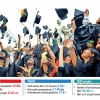The only budget I care about is one that reduces my bills

Every year, as budget day approaches, I feel a strange sense of déjà vu. It's like preparing for election day: the air is thick with anticipation, promises fly around like confetti, and hope flutters tentatively in our hearts. These two days are to journalists what the two Eid days are to devotees—the culmination of their pursuits that leaves them simultaneously animated and exhausted. On both days, journalists remain caught up in frantic activities, speeches and interviews, press conferences, and tireless decoding of every proposed plan, promise or projection. The newsroom buzzes with excitement from midday to midnight. There are special meals, special pick-and-drop services.
But seen from a wider perspective, both days also seem to be following the same script—lots of build-ups and rituals but a disappointing anti-climax in the end.
As a journalist, I am encouraged to look at the bigger picture on budget day, and think less of my own wallet and more of the wallets of my compatriots. But this façade, if I may call it so, is getting harder to keep up. For every time, as the finance minister concludes his speech and the numbers roll out, reality hits with a greater force. You worry where you fit into this maze of numbers. You rummage through them for a solution to your problem: stagnant income but inflated bills. And you feel as helpless as the next working person looking at the widening gulf between your budget plan and that of the government.
Budget day is thus turning into our very own Groundhog Day. Each time, we hope for change, yet the same reality comes back to haunt us. And the reality is, even after the proposed budget for FY2024-25 comes into effect, that cycle of stagnation and inflation will likely remain in motion. This may be my years of accumulated distrust talking. But think about it. When did we last have a budget, big or small, that sufficiently addressed job crisis or brought down essential prices? Even the FY2023-24 budget, which was 12.35 percent bigger than the previous year's, failed on both fronts. As the late Brazilian politician Jaime Lerner, famous for his low-cost solutions to urban problems, put it, "If you want creativity, take a zero off your budget. If you want sustainability, take off two zeros." I don't know about the government's motivation for going for a "tight" budget this time. But our main problem, in my view, is not that we don't have enough zeros for the more important sectors but that we don't know how to spend it even when we do.
I don't want to go into details about our budget implementation problem which we talk about, like clockwork, after every budget, and then throughout the year. But suffice it to say, this, along with corruption, irregularities and various entrenched systemic issues, have had deeply destabilising effects. The prices of almost everything from groceries and utilities to housing and education have gone through the roof. People are paying through their noses for essential healthcare. A budget has to make sense on a practical level for citizens, right? It has to deliver results beyond some shiny economic indicators or infrastructure development. Right now, this is not happening. I see scrolls and infographics detailing the proposed increase or reduction in import duties and tax rates, and I find myself asking: what does it all mean? Will it help reduce my monthly bills, or inflate them?
Perhaps I'm simplifying it a bit. You could say that rising prices are a global trend. In India, where I found the prices of food or groceries or commuter fares to be much cheaper compared to Bangladesh, one of the factors apparently leading to the humbling election result for the ruling BJP is high prices—or as they are calling it, people's "bread-and-butter issues". I guess, in the end, it all comes down to your lived experience. Your income versus living cost. You spend what you earn. What if you don't earn enough? Or you do, but just barely? You still try to set aside some savings for a rainy day, but what if every day becomes a rainy day? What's the strategy then?
Not long ago, I remember willing myself to survive on two meals a day, especially towards the end of the month. It doesn't help, though. You have a family to take care of. And you need more than a full stomach to pass through life. I can only imagine how people lower in the food chain are getting by amid the never-ending struggle between low or stagnant incomes and inflated bills. But that's a different story.
So, if you ask me what kind of a budget I need, the answer is pretty simple. I need a budget that relieves me of having to pay so much for the most basic of services and amenities. I need it to treat the cost-of-living crisis as a national emergency, not just a by-product of some economic influences that can't be helped. Above all, I want a solution to the unique development enigma that Bangladesh has become as at once one of the poorest and yet costliest countries in the world.
Is it too much to ask for?
Badiuzzaman Bay is assistant editor at The Daily Star. He can be reached at [email protected].
Follow The Daily Star Opinion on Facebook for the latest opinions, commentaries and analyses by experts and professionals. To contribute your article or letter to The Daily Star Opinion, see our guidelines for submission.

 For all latest news, follow The Daily Star's Google News channel.
For all latest news, follow The Daily Star's Google News channel. 










Comments